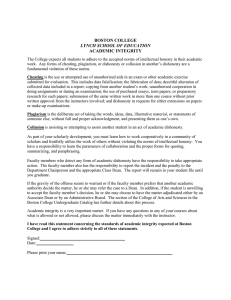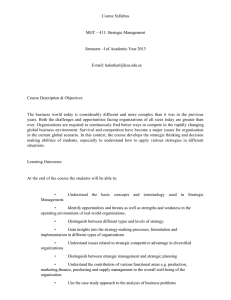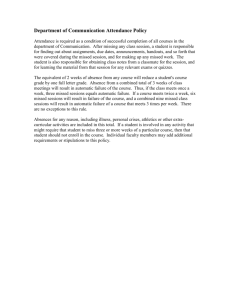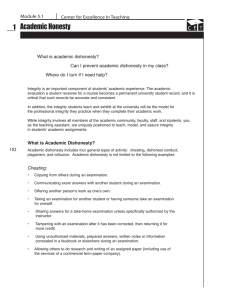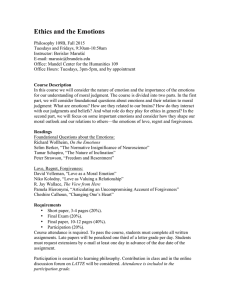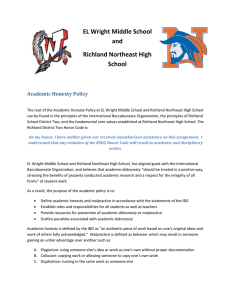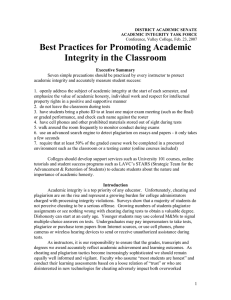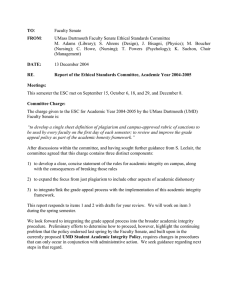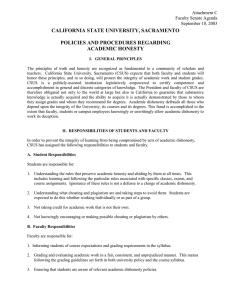Appendix I
advertisement
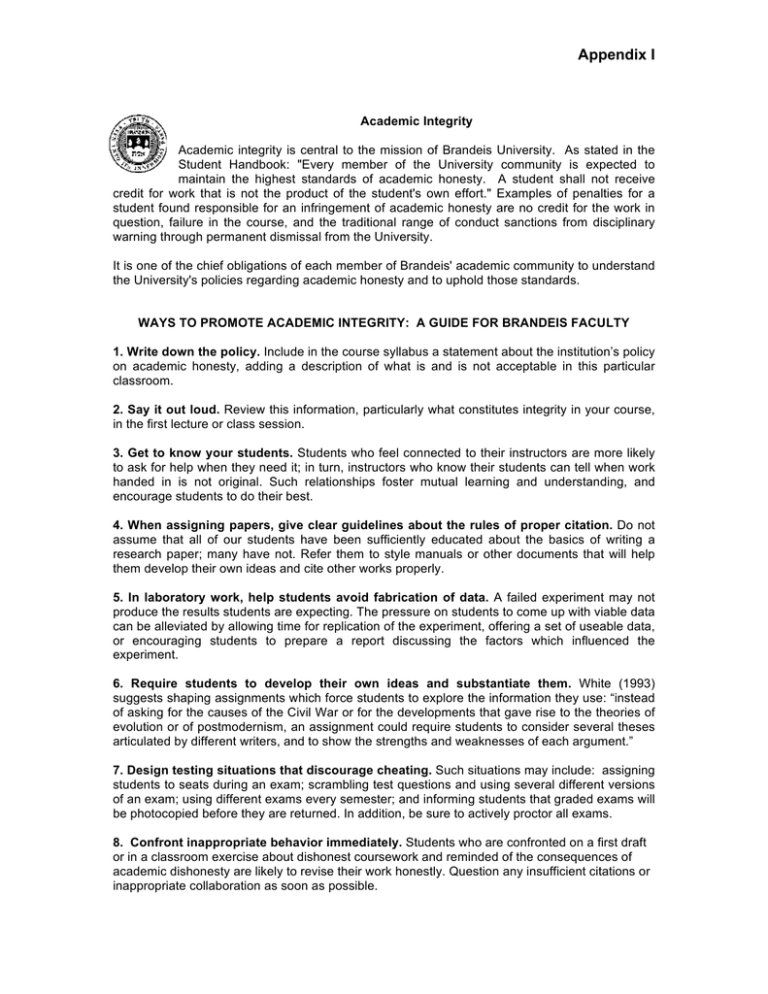
Appendix I Academic Integrity Academic integrity is central to the mission of Brandeis University. As stated in the Student Handbook: "Every member of the University community is expected to maintain the highest standards of academic honesty. A student shall not receive credit for work that is not the product of the student's own effort." Examples of penalties for a student found responsible for an infringement of academic honesty are no credit for the work in question, failure in the course, and the traditional range of conduct sanctions from disciplinary warning through permanent dismissal from the University. It is one of the chief obligations of each member of Brandeis' academic community to understand the University's policies regarding academic honesty and to uphold those standards. WAYS TO PROMOTE ACADEMIC INTEGRITY: A GUIDE FOR BRANDEIS FACULTY 1. Write down the policy. Include in the course syllabus a statement about the institution’s policy on academic honesty, adding a description of what is and is not acceptable in this particular classroom. 2. Say it out loud. Review this information, particularly what constitutes integrity in your course, in the first lecture or class session. 3. Get to know your students. Students who feel connected to their instructors are more likely to ask for help when they need it; in turn, instructors who know their students can tell when work handed in is not original. Such relationships foster mutual learning and understanding, and encourage students to do their best. 4. When assigning papers, give clear guidelines about the rules of proper citation. Do not assume that all of our students have been sufficiently educated about the basics of writing a research paper; many have not. Refer them to style manuals or other documents that will help them develop their own ideas and cite other works properly. 5. In laboratory work, help students avoid fabrication of data. A failed experiment may not produce the results students are expecting. The pressure on students to come up with viable data can be alleviated by allowing time for replication of the experiment, offering a set of useable data, or encouraging students to prepare a report discussing the factors which influenced the experiment. 6. Require students to develop their own ideas and substantiate them. White (1993) suggests shaping assignments which force students to explore the information they use: “instead of asking for the causes of the Civil War or for the developments that gave rise to the theories of evolution or of postmodernism, an assignment could require students to consider several theses articulated by different writers, and to show the strengths and weaknesses of each argument.” 7. Design testing situations that discourage cheating. Such situations may include: assigning students to seats during an exam; scrambling test questions and using several different versions of an exam; using different exams every semester; and informing students that graded exams will be photocopied before they are returned. In addition, be sure to actively proctor all exams. 8. Confront inappropriate behavior immediately. Students who are confronted on a first draft or in a classroom exercise about dishonest coursework and reminded of the consequences of academic dishonesty are likely to revise their work honestly. Question any insufficient citations or inappropriate collaboration as soon as possible. Appendix I 9. Be Direct. If you receive an assignment that you suspect is not that student’s own work, speak to the student directly. This gives the student an opportunity to justify their work, or to admit their dishonesty to you before becoming involved in the judicial process. 10. Investigate suspected cases. If you suspect plagiarism, you must gather evidence. Google.com is an excellent website for help in tracking information that you have reason to believe has not been appropriately cited by a student author. Google.com searches many other websites for key phrases and topics. Should Google disappoint, the following websites may also be of assistance are listed: 12000papers.com 15000papers.com 1millionpapers.com academictermpapers.com apex-termpapers.com bignerds.com chuckiii.com collegetermpapers.com coshe.com cyberessays.com essay.org fastpapers.com morepapers.com netessays.net oppapers.com papers24-7.com paperwriters.com realpapers.com research-assistance.com schoolsucks.com sparknotes.com superior-termpapers.com termpapers4u.com termpapers-on-file.com 11. Refer clear cases of academic dishonesty to the judicial system. Incidents of cheating and plagiarism must be reported to Student Affairs x6-3600. Allegations of academic dishonesty by undergraduate or graduate students are reported to Student Affairs for adjudication within the Student Judicial System. You may not adjudicate such cases on your own; to ensure equity and avoid litigation, such matters are the responsibility of the Student Affairs.
